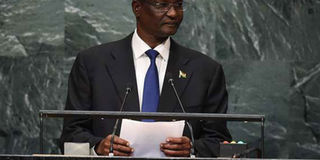S Sudan VP contradicts himself on need for peacekeepers

South Sudan Vice-President Taban Deng Gai addresses the 71st session of the United Nations General Assembly at the UN headquarters in New York on September 23, 2016. Mr Deng told the Associated Press that Dr Machar is welcome to return to the country. PHOTO | AFP
What you need to know:
- Mr Deng later appeared to reject deployment of the force that is intended to consist of soldiers from African countries.
- Both Mr Eliasson and Mr Ladsous called on the South Sudan government to take a more inclusive approach in talks on ending the conflict.
- Dr Machar has said that he does not feel safe to return until the Regional Protection Force is deployed.
NEW YORK
South Sudan's new first vice president sent contradictory messages in New York on Friday concerning his government's willingness to accept deployment of a 4,000-strong Regional Protection Force.
Vice President Taban Deng offered assurance in an address to the United Nations General Assembly that South Sudan “has consented” to a Security Council resolution calling for the dispatch of the additional troops to Juba.
“My government's position is that we have to engage more with the UN on the details pertaining to the implementation of this resolution,” Mr Deng said.
"This is in order to avoid derailing national healing and reconciliation. External intervention often affects negatively internal reconciliation.”
But in an interview earlier on Friday with the Associated Press, Mr Deng appeared to reject deployment of the force that is intended to consist of soldiers from African countries.
"I don't think South Sudan needs peacekeeping," the first vice president told the news agency, adding that his country is “not a dumping place” for peacekeepers “who really can't help”.
"We already have 13,000 UN troops in South Sudan who are sitting idle, not doing anything because there's a problem with their mandate, and there's also a problem with how they were selected," Mr Deng said.
The UN Mission in South Sudan administers camps at various locations around the country where it is protecting more than 200,000 civilians who have fled their homes due to fighting that broke out nearly three years ago.
Monitors have blamed government forces for attacks on the protection sites and for obstruction of UN aid operations.
Speaking to reporters on Friday evening in New York, UN peacekeeping chief Hevre Ladsous said, in response to Mr Deng's reported comments, “We heard different statements [from South Sudan officials] and this is another one.”
“When you agree to something,” Mr Ladsous added, “you have to live up to your promises”.
CAUSE OF VIOLENCE
He said there is no sign of South Sudanese cooperation with the effort to augment the peacekeeping force — a move endorsed by the East African leaders as well as by the African Union.
Mr Ladsous joined UN Deputy Secretary-General Jan Eliasson in suggesting on Friday that stabilising South Sudan will likely require the participation of former First Vice President Riek Machar.
He fled South Sudan in August after fierce clashes in Juba between government troops and Dr Machar's armed opposition.
Some components of the rebel force then named Mr Deng as the replacement for Dr Machar in the transitional government's number-two post.
But Dr Machar “is not dead politically”, UN peacekeeping head Ladsous declared on Friday.
“He is out of the country but he does represent a very important element of the South Sudan community.”
Deputy Secretary-General Eliasson said earlier in the day at a multilateral meeting on South Sudan that ongoing violence in the country is being fuelled by “the marginalisation of Riek Machar and his supporters, the sidelining of other opposition groups, both armed and unarmed, and the continued implementation of the 28-states order”.
The UN's second-in-command was referring to South Sudan President Salva Kiir's decree last December increasing the number of states from 10 to 28.
The armed opposition reacted negatively to that move, warning that it would exacerbate tribal divisions.
Both Mr Eliasson and Mr Ladsous called on the South Sudan government to take a more inclusive approach in talks on ending a conflict that has taken tens of thousands of lives and displaced more than two million civilians.
First Vice President Deng, on his part, charged in his speech to the General Assembly that Dr Machar had triggered the fighting in Juba two months ago that undermined a peace agreement reached last year.
Mr Deng told the Associated Press that Dr Machar is welcome to return to the country.
"He's [a] South Sudanese; he can decide to come to Juba anytime."
IN CONTROL
However, Dr Machar has said that he does not feel safe to return until the Regional Protection Force is deployed.
Mr Deng also assured the General Assembly that South Sudan is now “stable, peaceful and that my government is functioning and life is returning back to normal”.
That depiction contrasts starkly with Mr Eliasson's summary of the multilateral meeting on South Sudan that included representatives from Kenya, Uganda, Rwanda, Sudan, the African Union, the European Union and three of the five permanent members of the Security Council.
“They expressed great concern about the current political and security trends and the deteriorating humanitarian and protection environment in the country,” Mr Eliasson reported.
“They were unanimous in their alarm over the unspeakable toll the current conflict has taken on civilians, with more than 6.1 million people — one half of the South Sudanese population — in need of humanitarian assistance and the continuation of abominable human rights violations, including on ethnic grounds.”
Edited by Philip Momanyi




